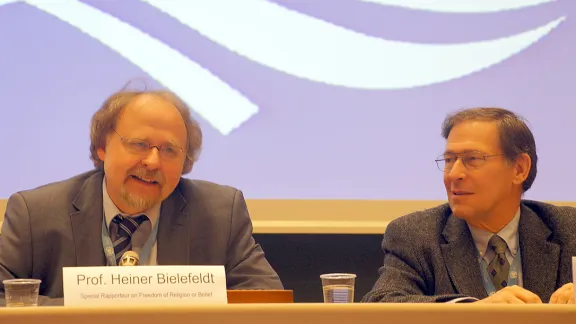
UN Special Rapporteur on Freedom of Religion or Belief Prof. Heiner Bielefeldt (left) and Mr Ralston Deffenbaugh, LWF Assistant General Secretary for International Affairs and Human Rights. Photo: LWF/P. Mumia
LWF Moderates Side Event at UN Human Rights Council
(LWI) – The Lutheran World Federation (LWF) humanitarian cooperation with the Islamic Relief Worldwide (IRW) is an example of “meaningful actions that help to enhance open-mindedness and open-heartedness towards freedom of expression and freedom of religion in society.”
The UN Special Rapporteur on Freedom of Religion or Belief Prof. Heiner Bielefeldt made these remarks during an open dialogue side event with representatives of civil society organizations attending the 28th session of United Nations Human Rights Council (UNHRC), 6-27 March in Geneva.
The rapporteur’s report to this year’s UNHRC had described the various forms of violence perpetrated in the name of religion today, argued why they did not reflect historic sectarian hostilities, and offered recommendations for all stakeholders including States, civil society and religious communities.
Mr Ralston Deffenbaugh, LWF Assistant General Secretary for International Affairs and Human Rights moderated the 12 March side event, which the LWF jointly organized with the Baha'i International Community's UN Office and the International Fellowship of Reconciliation, on behalf of the NGO Committee on Freedom of Religion or Belief.
Responding to participants’ questions, the Special Rapporteur encouraged faith-based organizations (FBOs) and other civil society members to use the space available under the UNHRC to mobilize positive developments.
Bielefeldt said the increasing interest in freedom of religion today was also partially based on growing suspicion and confusion. The public discourse on widely publicized events such as the Charlie Hebdo magazine attacks in France, militant group atrocities in Iraq, Nigeria and other countries, seems to bring back the old question of how to reconcile freedom of religion and freedom of expression as if the two were antagonistic rights, he argued.
“Freedom of religion and belief and freedom of expression are mutually reinforcing norms and ‘neighbors’ for which no one should be subjected to coercion,” he added.
Minority and Majority in Solidarity
The Special Rapporteur encouraged civil society towards “cross-over” engagement with each other in order to deal with violence committed in the name of religion. He said it was important to involve the “majority” when showing solidarity towards people persecuted because of their minority situation. “While minorities are quicker at getting on board as they see the benefits, the majority should also see it as open space to become engaged. It is not a question of pro-minority versus pro-majority but all getting on board.”
Bielefeldt noted that cooperation also sends a much-needed message of hope to people affected by violence and to the international community, and constitutes good practices that may inspire others.
He mentioned the work of the Inter-Religious Council of Sierra Leone as a clear inspiration of how FBOs can enhance cooperation and co-existence. “In a Muslim-majority country, with a large minority from different Christian denominations, and where conversion is not a problem, people live together; actively reaching out to each other also with the heart,” he said.
The Special Rapporteur noted that there was no natural law prescribing hatred between people of different religious orientations. He emphasized a consistent focus on human rights as “the common denominator that brings together human beings who manifest religious beliefs, practices and rituals in all their irreconcilable differences.”
For Deffenbaugh, the side event had provided an opportunity to have an important informal discourse on freedom of religion at a time when violent acts are so often clothed in religion. “The Special Rapporteur underlined that there is no religion that can be said to be a “violent” one. Just as it is human beings who have rights, not religions, so it is that human beings have responsibility for violent actions, not religions.”


